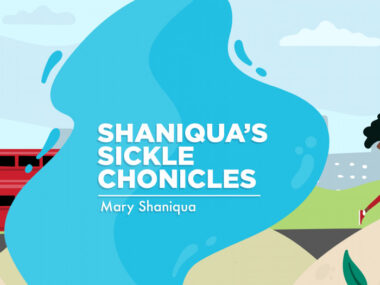Want to Have Children Without Sickle Cell? Think Through the Options
Written by |

Every year on my Twitter feed, I see a tweet about how important it is to know your genotype, as well as your partner’s. I agree with the rationale for this; it’s important to be as prepared as you can when dating. Understanding how genotypes work means you can prevent passing on genetic conditions like sickle cell disease to the next generation.
Unfortunately, these discussions can often take a dark turn, as some people believe health screening takes away from the organic nature of dating. In some comments, I’ve seen this form of screening referred to as eugenics. “Selecting for genes is unethical,” they say.
As a patient with sickle cell, I do not agree with this thinking.
From my own experiences, I understand how painful living with a condition like sickle cell is. It affects every aspect of one’s being, from mental to physical health, and there is no telling how severe it will be. I would hate to pass on sickle cell to my future children, knowing how it has affected me and others in the community.
My parents both have the sickle cell trait, but they had no idea because they had no symptoms. They had a 25% chance of having a child with sickle cell, and that’s what fate decided for me at birth. Genotype testing wasn’t as common back then, so I understand they didn’t realize the gamble they were taking. But for me to do the same with the knowledge I have feels irresponsible.
Therefore, the decision to have children is a well-considered process for me. I couldn’t bring anyone into this world to suffer from sickle cell the way I have. Asking potential partners early on “what is your genotype?” allows me to decide how to proceed.
I have researched my options if I did want to start a family with someone who has the sickle cell trait.
Diagnostic tests
As I have sickle cell disease (HbSS genotype), if I were to have children with someone with the sickle cell trait (HbAS genotype), there is a 50% chance the child would get the sickle cell trait and a 50% chance they would get sickle cell disease. Having a child through natural conception would require having a diagnostic test from 11 weeks into the pregnancy to find out whether the child has sickle cell or not.
Finding out at this stage would be difficult for both parents. This wouldn’t be an option for me because of my personal beliefs.
IVF with preimplantation genetic screening
In vitro fertilization (IVF) with preimplantation genetic screening is one method to prevent having a child with sickle cell before conception. Embryos are taken from the mother, fertilized, and then screened for sickle cell. The embryos that do not have the full sickle cell gene are selected.
At first, I felt this would be a viable option as we could prevent the possibility of offspring inheriting sickle cell. Researching further, however, I realized the considerable strain on the mother to get the conditions needed for a successful procedure. IVF doesn’t have a 100% success rate, so the emotional and physical toll would be immense.
There are a considerable number of risks and preparations for this option, and I’m simply not comfortable with them.
Adoption or surrogacy
Not everyone has the ability to have their own child, and not everyone wants to. Adoption is another option I have thought about because I wouldn’t be passing on the sickle cell gene. If I were to date someone with the trait, I would strongly consider this option. I’ve always had a strong desire to create my own family, and I recognize there are many ways to do this.
In an ideal world, I wouldn’t have to think about these things and there would be an easy and inexpensive alternative. At the end of the day, I’m a strong believer in knowing your genotype and making the right decisions to support the next generation.
What that looks like will always be a personal choice, but it’s important to be informed.
Note: Sickle Cell Disease News is strictly a news and information website about the disease. It does not provide medical advice, diagnosis, or treatment. This content is not intended to be a substitute for professional medical advice, diagnosis, or treatment. Always seek the advice of your physician or other qualified health provider with any questions you may have regarding a medical condition. Never disregard professional medical advice or delay in seeking it because of something you have read on this website. The opinions expressed in this column are not those of Sickle Cell Disease News or its parent company, Bionews, and are intended to spark discussion about issues pertaining to sickle cell disease.







K Patel
I am afraid, the article gives a prescription, it has given three options though. It is important to mention that one with SCD should look for someone neither having the trait nor the disorder and marry such a person. Of course, it may be difficult to get one who will be willing to marry one having SCD. The society must be educated and people should come forward to help the future generation.
Dunstan Nicol-Wilson
Hi K thanks for your comment. I agree, my stance is to ideally be with someone without SCD or the trait. However, I recognize there are those that have a different view or stance. I wanted to highlight options to consider that prevent passing on the disorder to the next generation in that scenario. Education is key.
Richard Poulin
My wife and I are autosomal recessive carriers of a rare disease. We have one daughter who suffers from AADC. We always wanted a large family and consider the same options as you mentioned. Based on the promotional materials from IVF clinics, it seems perfect, but you have to read the fine print. In Thailand, they usually use multiple embryos to ensure one is "viable" and then discard the rest. This is not an option for us and also does not align with our beliefs. We have since dedicated time to volunteering with children but may consider adoption. Thank you for sharing this important topic.
Dunstan Nicol-Wilson
Hi Richard, thank you for sharing your experience. I really appreciate your perspective, I hope you find the option that works for you!
Christabel
So in the circumstances where you dnt get a partner that is Aa whiles you are As is the IVF a good option or the 11 weeks testing . Which wine has a higher change of given the right results ie 90-95% correct results.
It’s really worrying if one is AS and not getting an AA partner does that mean he or she will not marry?
Dunstan Nicol-Wilson
Hi Christabel, thanks for your comment. I would advise speaking to a consultant or healthcare professional about the options available to you
Emmanuel ARSHAD
My gf and I are both AS, I came across this page while researching IVF, I am determined to give this a trial and with my last blood as I can not think of spending my life with another person.
I wish myself God's best and I hope She has the same determination as I do. She's actually the determinant here
Dunstan Nicol-Wilson
Hi Emmanuel. Thank you for your comment. I wish you all the best on your journey.
AG
I wish you divine protection as you embark on this journey as I intend to do same . Please I need more inform if you have a legit hospital which does genotype determinant plus IVF. Thanks.
mary
I really am at a cross road right now. my partner and I are are AS and it's so hard to think of being with anybody else but him. I wish I could come in contact with people who have successfully had this testing and bore healthy kids through it
Licia
Please did you succeed in it.
In similar issue
Dunstan Nicol-Wilson
Hi Emmanuel. Thank you for your well wishes, blessings to you also. I don't have this information I'm afraid. Good luck on your journey!
AG
Thank you for providing this valuable information and for sharing your thoughts and opinions. My partner and I have sickle cell traits, and we are planning to start our family. I have been researching facilities or individuals who have had successful experiences with IVF preimplantation genotype determination. I would really appreciate it if we could connect to support each other on this journey. Thank you!
Daniel Soneye
I am in the same situation as you but I am the determinant here, she is fully ready. I am just scared of what if things don’t work out as we are imagining it and the stress is just too much. I am just as confused as anything and I still don’t know if we should continue and take the risk or go separate ways.
Liettew Claire
Hello,
Thank you for your thoughts. I understand the ethical quandaries, but have you considered genetic engineering in tandem with in-vitro fertilization as a potential avenue?
Cheers, LC
Murtala Hamdalat
My Fiance and I had dated for 6 years not realizing that his test result was incorrect, when we realized it was too late as we couldn’t think of parting ways at this point, rather to find a solution.
I was researching IVF when I found this article. I wish there is someone who at least have successfully done it and have healthy and beautiful kids😞
Nwankwo Chigozie Johnpaul
Hi,
Coming across this has given me a great deal of hope. I'm currently a sickle cell patient (HbSS) and my woman is a carrier. We have been searching for ways to get a child who's not sickle cell and this article has helped a lot. I'm gonna discuss this with my woman and give it a trial. If it doesn't work then we can go for separate surrogate parents.